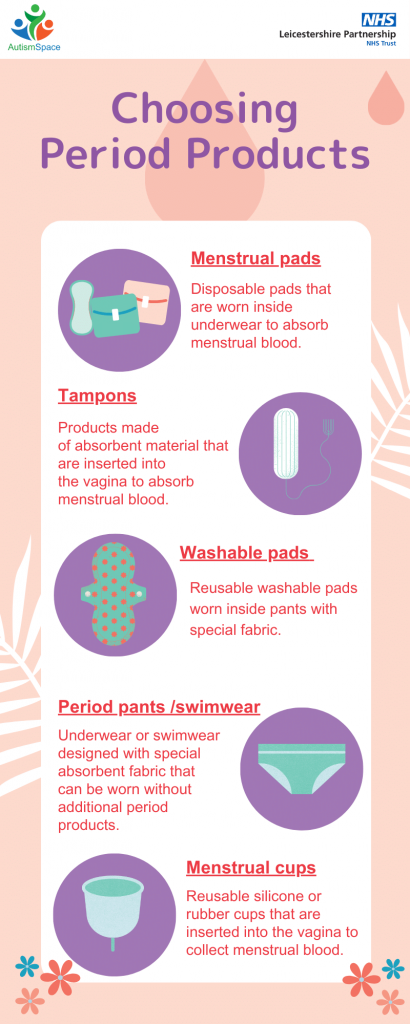Sensory issues
One of the most common causes of sensory issues is hygiene products. There are numerous different products available, and there are alternatives to tampons and sanitary towels/pads. You need to do what feels most comfortable for you.
Washable period pants and swimwear has become popular, with many high street retailers now making their own versions. Period underwear absorbs menstrual blood within layers of microfiber polyester or bamboo. By offering a snug fit, it allows the multiple layers of fabric to ensure that blood remains inside the material instead of leaking through.
There are a range of absorbency levels to accommodate different levels of flow, some hold the same as a panty liner while others can hold the absorbency of two tampons.
There are also a variety of styles available to suit an individual’s tastes or preference, even boxer styles that could be beneficial for individuals who don’t identify as female but do menstruate. Some of the manufacturers are now making swimwear with the same idea, which is great!
Reusable cloth pads are less popular and mainly sold by small businesses on the internet. These work in the same way as period pants, however, are more the shape of a disposable pad. The stitching is often on the inside, making them more comfortable on the skin. The shape and length vary. Some have ‘wings’ with poppers or clips to secure them in place, although this might be uncomfortable for some people.
Menstrual cups are small silicone or thermoplastic elastomer cups (material used in baby bottle teats). The cup rolls or folds and is inserted internally to collect the period blood, which can be difficult to get used to. The cups can be used for 8-12 hours, which may be beneficial for anyone struggling to use or access public toilets. As they are used internally, you are less likely to feel a sensory change of dampness, which sometimes happens with external products.
Certain autistic people can also be hyposensitive, causing sensory-seeking behaviours. This could include needing to wear a pad every single day because it gives consistency of the feeling. Other autistic people may be sensitive to the smell of period blood and avoid changing products frequently, therefore may need reminders or have set times.
Sensory issues for autistic people are not just related to hygiene products in the menstrual cycle, as some people describe that their diet can also be more limited in the premenstrual stage, possibly due to nausea.
Some autistic people find that their usual physical health problems become worse at the time of their period too, for example their digestive issues and allergies.
Click here to view or download this graphic as an accessible pdf
Executive function
Periods can impact on an autistic person’s executive function, leading to difficulties managing time, completing tasks, and making tasks.
Personal care or changing products can be very complicated or seemingly impossible at times. It is believed that some hormone changes can have a negative impact on this.
To help you could carry spare underwear and period products with you. Or try using a period tracking app to understand your cycle to help you feel more prepared. Many people set reminders on a phone to change period products and manage personal care, which may be different to your usual routine.
Premenstrual syndrome
PMS symptoms can make an autistic person more emotionally sensitive, resulting in an increased likelihood of meltdowns/shutdown.
Some people may have difficulty communicating their emotions or emotional symptoms, and this can cause outbursts or a change in behaviour. If this is the case, it may be beneficial to use a period tracking app or a diary to help you identify emotions along with when and why they change. If you are struggling, try to reduce the demands placed upon you and be kind to yourself – its ok to rest and say no to things.
Although rare, if your symptoms are extreme with considerable amounts of emotional and physical distress or are deliberating, this could be premenstrual dysphoric disorder (PMDD).
PMDD can appear to be more common in those who are autistic because of differing levels of interoception or because some hormone changes can cause increased feelings of overstimulation and overwhelm. If you are concerned that you have PMDD, arrange an appointment with the doctor.
_____________________________________________________________________________________________________________________________________________________________
For our directory of health related resources and services, please click here
_____________________________________________________________________________________________________________________________________________________________





